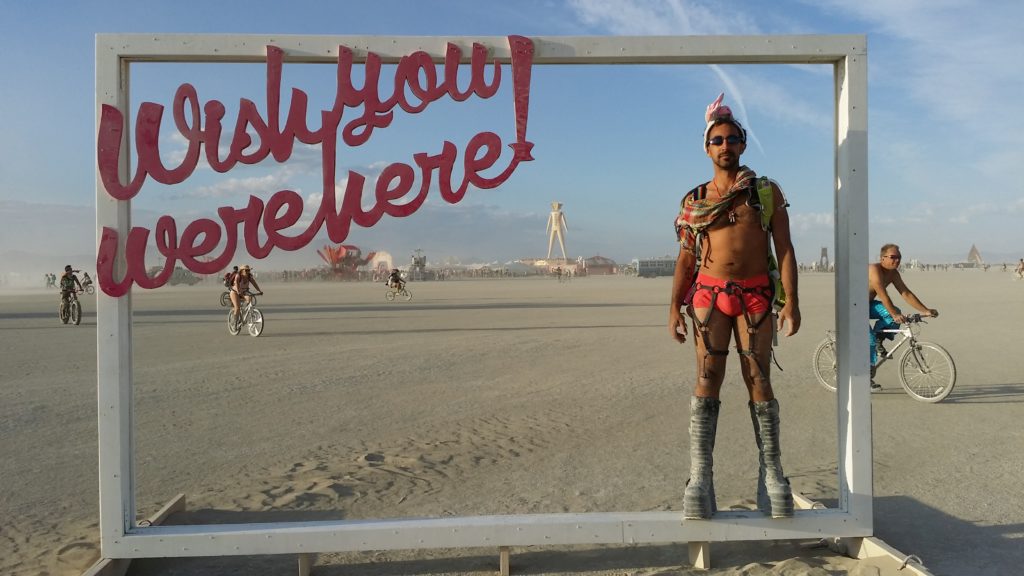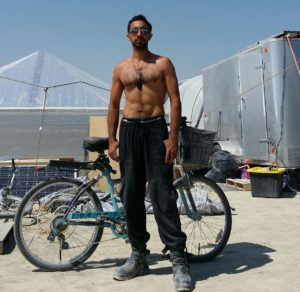
This is Zed at Burning Man.
22. poly cocktails: horizontal with my hacienda housemate
This intro was recorded in Baltimore, MD because, throughout the month of October, horizontal does america. It’s just me, a Honda Civic, and a backpackful of recording equipment circling the United States together … and you can be a part of happening it. Patreon.com is a platform for crowdsourcing patronage.
Zed: I think I could actually trace it back to one young lady, her name … was Katherine and … she was dating a guy and a girl at the same time.
Lila: Mmmm!
Zed: And I … was so curious and so turned-on by the whole thing, and it was something I wanted for myself like this uhhh, limitless expression of love and sexuality, that’s what I wanted. I didn’t actually pursue that in high school, but I knew of it. So then when I graduated high school, I tried to create relationships that were in that format.
Lila: How’d that go?
Zed: It went well. I should say — it was a great learning experience. (both laugh) So… and every relationship I entered, I immediately said, you know, “I want to be with you, but I want the freedom to pursue or date other people, should that come up.” And the format for that was: whatever would transpire, we would be … forthcoming and honest about it. So if whatever night me and my girlfriend weren’t together and if I was with anyone else, if it was planned I would let her know, and if it happened, as in something spontaneous would happen, I would also let her know. And this was great because it was a lot of freedom to express, on each side, and I did this for several years. And it felt very— scary at times, to the point where like one of the more difficult experiences I had … I knew it was something I wanted for myself, and I had to … break some emotional training… One of my girlfriends at the time — I should say uh, in the open relationship structure that I was practicing, it was: one main relationship, and then we could date, and be sexually-active with other people, as long as there wasn’t any emotional or romantic commitment with this other person.
Lila: Monoamorous.
Zed: There we go. Great way to put it. My girlfriend at the time had a crush on one of my co-workers, and I knew this, and so I encouraged her. Go ask him on a date, go on a date, like uh you know, I want you to explore like I wanted, I wanted to encourage her to see what would come out of that. And this person was older, and well-established, and, really well-liked, and I … when they went on their, their date, I got incredibly jealous, to the point where I just started like crying the rest of the— like, almost the entire date, when they were out. I mean, I … I knew this was something I wanted to break in me. This attachment to … the attachment and fear of losing her and seeing her as property. It was all these thoughts that were based on fear.
*
Lila: I think my mother was always trying to get more attention from my father than he was willing to give, or had to offer her. And he would often come home from work, and he was a child psychologist in the New York City school system — so you can imagine it was a draining job — and he was talking to people all day, and he would come home and my mom says that he would go straight to the garage into his woodshop, and work there. And I think she was lonely; she was an immigrant. She had im— emigrated to be with him, from Brazil. On Long Island, she was very much the outsider. She did not have other— there weren’t other Brazilians around. She didn’t have many friends— she had some, it took time to make them. She made friends with some neighbors. She was always very gregarious and colorful and vibrant, but I think that made her even more of an outsider in this … suburban kind of, I think very probably closed-minded, mother society. Maybe a “soccer mom” kind of society. And now I imagine her loneliness. That she would be waiting for my father, and he would come home and he would go into his carpentry. And she just wanted affection and attention and she was millions of miles away from her family and all of the— she had a lot of friends when she was young in Brazil. She was the class clown; she had very very close friends, my godfather, godmother, and extended series of family, she was close with her family, and she left all of that to be here and she was … by herself and, and for the first several years she really struggled with the language, because she didn’t even speak English when she came. So I imagine her isolation, and also her strength. I can see how, from both sides, it was such a strain for them, her feeling so lonely and isolated and wanting his attention, and him feeling so … drained and exhausted and needing to recharge alone, as, as I do, I think I get that from him and it’s hard for my mother to understand in me, but I think I’ve finally explained it to her, that I, I can’t be with someone for many many many hours, I need a break. I need some time for myself. And I think, when my parents divorced, when I was twelve and I moved with my mom to Florida, my mom tried to put me in that place … as the person to give her attention and what she needed. Even though she had a series of boyfriends. When she had a boyfriend it was a little bit better, because she got attention from the boyfriend. In CoDA terms, we would call this emotional incest—
emotional incest (noun) = a relationship in which a parent relies on a child for the emotional support usually provided by a spouse or partner. [This is a controversial term, accused of incorrectly inflating the statistics on child abuse.]
—where you’re trying to get the emotions from your children that you really want from a partner. The attention and time and affection from your children. And I would rebel, and I became, with her, very nasty. Because I was trying to protect my space, my personal space, and she would become angry when I wanted to spend time with my friends. “Oh, you just want to spend time with your friends!” Yes, I, I did! I was a teenager! Of course I did, you know! Needing to learn how to develop social circles to support me as I go on throughout my life, right, that’s the time when you’re developing networks. And I would fight, I would fight hard, and try to draw boundaries, and later on that’s, that’s what I realized that that’s what I was trying to do, I was just trying to be boundaried with her. And we fell into this awful pattern, where she would become hurt because I was trying to draw a boundary, or take time for myself, or—seek attention elsewhere. She would get nasty— she has a temper, she’s a Scorpio and she has that stinging thing where she knows just where to poke you so it really hurts. I would cry. Then we would be in silence for a little while. Then she would apologize. And we’d be okay for a little bit. And it would start again. And I’ve been working very hard, particularly over the past 10 months, to break that pattern. And I’ve talked about it with her now, aloud. That I don’t want to enact this. I don’t want to do this. And here are the reasons why I think I’ve kept myself from being really open … to your … love. Because I don’t seek affection from my mother. I, I, I want to want to. My parents are both 75. They are both alone. I don’t know how much longer they’ll be alive. So I’m— trying— to build more of a bridge to her. To allow her to love me, and to try to … put aside some of the resentment that I must feel, from her getting cancer when I was a kid, which is something she couldn’t control, the resentment I feel from her being a depressed person, and from her trying to make me fill that emptiness inside her. I don’t want to be resentful anymore; it’s poisonous.
Zed: I’m hearing a lot of parallels. No wonder we annoyed each other a lot in the beginning!
 In this episode, I lie down with my housemate Zed.
In this episode, I lie down with my housemate Zed.
He’s a sound engineer who works mainly on musicals, and before he moved into the house, he worked on Broadway touring shows for seven years.
Our relationship has been fraught in the past, especially during the early months of living together, which we share about in the second half of our episode. Our respect for each other has grown, though.
Zed’s motto is, “Always leave it better than you found it.” He often lives up to that. And without Zed’s generosity, this podcast would probably not exist, as, up until two weeks ago, I was borrowing my sound equipment from him. He is fiercely dedicated to his work and our home, Hacienda Villa, a sex-positive intentional community in Bushwick, Brooklyn.
To record this with me was a great act of bravery on his part, and I hope you feel that.
In the first half of our episode, we talk about the sex table, the “poly” house, outsiderness, and being a sex-positive germophobe.
Come on. Come lie down with us.
Links to Things:
Hacienda Villa, the intentional community we both live in
horizontal does america, my cross-country solo road trip recording tour!
Poly Cocktails, a mixer for the polyamorous and poly-curious in NYC, hosted by Open Love NY
Show Notes (feel free to share quotes/resources on social media, and please link to iTunes, this website, or my Patreon!):
iTunes link: https://itunes.apple.com/us/podcast/horizontal-with-lila/id1238031115&ls=1
website link: https://horizontalwithlila.com/
Patreon link: https://www.patreon.com/horizontalwithlila
[5:03] Zed’s elementary school crushes. “So, elementary school, I remember always having multiple crushes, and feeling really annoyed that I had to only pick … one at a time. You know I just, did what I was supposed to do and would be interested in one young lady and that would be, you know — or I should say, pursue only one … at a time.”
[5:30] What was Zed’s high school lunchroom “sex table” like?
[7:33] Who introduced Zed to the concept of an open relationship?
open relationship (noun) = the umbrella term for any romantic and/or sexual relationship in which those involved are able to be romantic and/or sexual with others, while remaining within the bounds of their agreements.
[9:58] Zed’s relationship structure at that time made him monoamorous, which, in this case, meant that he and his partner could have dalliances with others, as long as their dalliances didn’t involve emotional or romantic commitment.
[12:02] How Zed managed his fear of losing his partner.
[13:02] Why Zed believes that sexual/romantic freedom is so vital.
[13:26] What happened when Zed, while in his monoamorous relationship, met someone else he wanted to become romantic with?
[16:04] “When in your heart you can say, ‘Fuck you, I don’t deserve this, get the fuck out of my life,’ there is— that is the easy way, right? It’s so much harder to say, ‘How do I take the love I have for this person, and continue to love them but in a different way?’ Watch them, allow them to find what’s better for them, that’s hard work. That’s hard work.” – Lila
[17:06]
Zed: This person is a member of my family for life. And we needed to go through this transition, we needed to end the relationship—
Lila: In, in one form so it could maybe renew in another form or— transform … transmute, maybe.
[17:43] When Deniz first heard the term poly … and recognized himself in it.
[18:51] Deniz’s first experience with Poly Cocktails.
[21:05] What happened when Deniz tried to start an art commune?
commune (noun) = a kind of intentional community in which members pool resources and share responsibilities, often working alongside one another on a farming or manufacturing project, or another sort of group-owned business
[23:22] Deniz’s first reaction upon learning about the “poly house,” which turned out to be the sex-positive intentional community Hacienda Villa (which is by no means limited to those who are polyamorous).
[24:04]
Zed: In my mind, I had no intention of living with a bunch of strangers.
Lila: (light laugh) Right, you wanted to curate your community.
Zed: Exactly. Sooo—
Lila: Which makes sense to me about you, knowing you.
[25:00]
Zed: My first impression was to be guarded since I had some … I had a lot of judgement going on, actually.
Lila: Me too.
Zed: It was “Well, if these people are ‘poly,’ that means they’re promiscuous, and if they’re promiscuous, they’re probably unsafe and reckless about their sexuality and sexual expression.” And, you know, I’m a germophobe as it is. So when I went in, I was a little bit worried about … my interactions with that. And I suppose, I was confronted about my own, you know, sexual freedom and sexual expression. And looking back at it, what I come to realize is then, I was afraid, because I didn’t really know myself as well as I thought I did, both in relationships and sexually. And what I came to find, after eventually, you know, getting to know people a bit more and moving in and everything else, is that in fact, everyone operate— everyone there operates at a very high level of communication and practice … safer sex.
Lila: Right, because the premise is that, safe is inherent uhh— sex is inherently risky, and we can make it safer, but we can’t make it totally safe because there’s no way to isolate and negate all the variables involved in sex. But we can be as conscientious as possible. We can also determine what level of risk we are personally comfortable with. I’m comfortable with— I would imagine that, of the people in the house, there might be one other person, maybe two, who has the level of risk-comfort that I have, which is fairly low. I’m not highly risk-tolerant. I wouldn’t call myself a germophobe, but I have this— I have similar tendencies as you do to be concerned about engaging with promiscuous people sexually. That makes me nervous.
Zed: Yeah, I used to uh, joke around with friends, I would inquire, “Do you think— is it wrong to ask somebody to wipe them down with hand sanitizer right before we engage in any sexual activity?” Friends would chuckle and female friends would be like, “That would burn. A lot.”
[29:30]
Zed: It’s what I want but I wouldn’t call myself polyamorous until I can actually succeed in it. I desire polyamory, but I’m not actually— I, I wouldn’t say I’m practicing, I wouldn’t say … I wouldn’t say I’m … I’ve crossed that threshold. I, I haven’t made that benchmark for me.
Lila: I like that distinction. For now, you’re practicing ethical nonmonogamy with an eye towards polyamory.
Zed: Correct. And that to me is the next breakthrough I want to have is being able to sus— you know, to do that sustainably.
[31:35]
Lila: When or how did your perception about the people who live at the Villa change? Did it change during your interview? During my interview, Kenneth dispelled some, some myths or some preconceptions that I had. For instance, in my interview, he said, “We don’t sleep with each other here,” and I was immediately 75% of my concern was relieved. Because I was, thinking, this is going to be like The Real World: The Sex House.
Zed: Oh, that’s what I thought too! Ugghhh—
Lila: —and that sounded—
Zed: —that’s what I— didn’t want!
Lila: —and that sounded terrible, and dangerous and and so um, so opposite of what I seek in a home, so uncomfortable and volatile and when he said “yeah we don’t sleep with each other and this is a sex-positive intentional community, not everyone who lives here is polyamorous, we support everybody’s right to make their own choices and to change their choices,” I thought, “Oh, wow, this is the place for me actually,” and when I left my interview, I felt certain: this is my home; this is my new home.
[32:44] How Lila came to live at the Villa.
[37:29] The housemate that changed everything for Deniz.
[39:05]
Zed: Kate was, or rather, I should say, is this beautiful, intelligent, kind of sexy, nerdy librarian vibe to her—
Lila: Yeah! Yeah.
Zed: So, in that sense … she normalized it for me, like it was, it was so natural to her, and she just seemed so happy with her love … her relationships, and I knew that’s what I wanted. I definitely saw what I’m aiming for in her.
Lila: Mmhmm.
Zed: I believe at the time she had three significant others … or I should say three—
Lila: —partners.
Zed: Three partners. And she was managing really well with that. She was going for her— I believe her graduate degree at the time, and she was able to excel in that, and excel in these rela— these three relationships.
Lila: Yes, how did she manage? Hmm!
Zed: Really amazing levels of communication, which is something I also wanted.
Lila: Aspire to?
Zed: Mmhmm. Just how candid she was and how authentic she was … with all her partners. And in a lot of ways, she made it seem so effortless.
Lila: (laughs) With a lot of work, she made it seem effortless. (continues to laugh)
Zed: I know, but the way she was talking about it was so … easy.
Lila: Maybe that’s what it sounds like when somebody’s really found the system that’s right for them. The work doesn’t feel like work, maybe, if it’s right for you.
[41:11] What was Deniz’s parents relationship like?
[42:01]
Lila: So they got together because of you. Do you feel … burdened by that fact?
Zed: … Sometimes.
[43:06] Deniz’s belief that we inherit emotional states from our parents and grandparents.
[43:35]
Zed: For me, the way I handled the emotional discord in my house … was by being guarded. I, I, I was guarded with myself and with others, so I wasn’t … as … aware of my state, and that’s the way I coped it, I basically numbed myself out. And … I could almost pinpoint it around first grade. There— there was an incident in the schoolyard, and, with some horseplay I was holding a girl around her stomach and I guess she had a really big lunch and I made her throw up—
Lila: Oh no.
Zed: — and that was the, one of the popular girls in school, so I got ridiculed for that … and that kind of, I felt, well, I felt very shut out, so I continued that, for myself. I created that, being unaccepted.
Lila: You continued to play out the script of being the outsider?
Zed: Yeah. Which fit well with being emotionally guarded.
22. poly cocktails: horizontal with my hacienda housemate
This intro was recorded in Baltimore, MD because, throughout the month of October, horizontal does america. It’s just me, a Honda Civic, and a backpackful of recording equipment circling the United States together … and you can be a part of happening it. Patreon.com is a platform for crowdsourcing patronage.
Become a patron of the horizontal arts, by supporting me on Patreon, a website for crowdsourcing patronage! Patronage allows artists like me to buy equipment, schedule recording tours, and devote my time to creating more horizontal goodness, for you! Becoming my patron has delicious benefits, ranging from exclusive photos and behind-the-scenes video content, to handwritten postcards, spring cleaning phone calls, and creative input on future episodes! You can become a patron for $1 a month on up, and the rewards just get more sumptuous.



